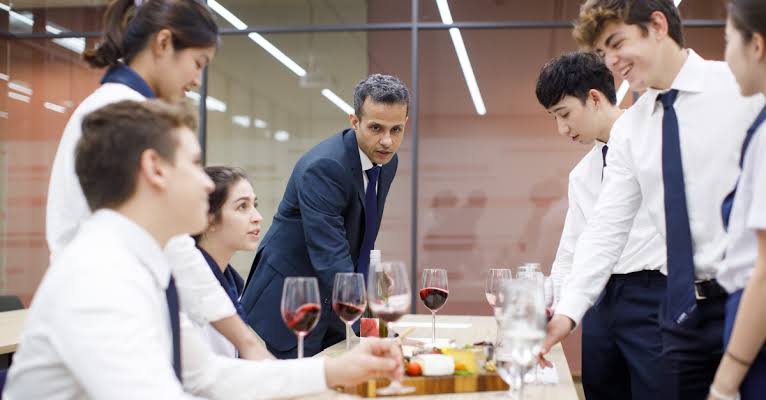While there are challenges and issues that need to be addressed, Indian hospitality education is making significant strides in providing international exposure, adopting innovative practices, and ensuring that its degrees hold international value.Hospitality Biz looks talks to some industry leaders to understand the changing scenario.
Hospitality education landscape in India has been undergoing a sea change. Evolution has come in as they have been competing and partnering effectively with their international counterparts. While many international institutions have joined hands with the Indian institutions to set up an extension of their educational platform, there are some who have spread their wings into the Indian market on their own too.
Hospitality education in India has evolved significantly over the last two decades. Today, India boasts world-class hospitality institutions with top-notch infrastructure, quality faculty members, and a well-designed curriculum. Decoding this further, Dr Bhuvan.G.M, Principal, Apeejay Institute of Hospitality, Navi Mumbai said, “Faculty members are actively engaged in research and publications, with many pursuing PhDs and holding doctorates. The teaching-learning process has undergone substantial changes, focusing on updated industry-centric curriculum. Assessment by accrediting bodies like NAAC has further enhanced the quality of hospitality education, leading to Indian hospitality graduates finding employment globally.”
Delving further on the point, Dr Chef Saurabh Sharma, Professor, School of hospitality and tourism management Manipal University Jaipur added, “Hospitality education in India competes with international counterparts by offering a blend of theoretical knowledge and practical experience, often through collaborations with global hospitality brands, signing MoU’s with international universities and colleges for student exchange program or international internship opportunities to ensuring students are well-prepared for the industry’s demands worldwide and marking the food print on global market.”
While Indian hospitality education has made significant progress in aligning with international standards, there may still be areas for improvement, such as increasing the focus on practical training, enhancing industry exposure, and promoting research and innovation in the field. Overall, however, the quality of hospitality education in India is steadily improving and is increasingly being recognized on the international stage.
Highlighting the core difference between Indian and international institutions, A K Singh, Director, FHRAI Institute of Hospitality Management said, “Indian hospitality education is focused on management of hotel operation whereas in international scenario specially U.S. and most part of Europe it functions as Business School and entirely focused on only managerial knowledge and skill that help in decision making. In Indian context the focus is on hotel operation and its management is correct, as being the large country, if we focus on only Managerial input then least number of graduates will get job opportunity, whereas in operation and management we train people and get them employed at entry, supervisory and management trainee level. Thus, our hospitality education is more inclusive but lacks the knowledge and skill needed for decision making including problem solving, business forecasting, etc.”
There has been considerable effort made towards bringing in the much-needed change in the hospitality education system in India. To make hospitality operation and management education more industry relevant there is a need to increase the experimental learning opportunities in close association with industry, and provide more exposure in the long-term or project-based experimental learning.
“This will not only help students in gaining knowledge and skill but will also add to their ability to give best output as a team comprising of people coming from different culture, educational/ social backgrounds. In addition, it will also give an opportunity to face real life problems and arrive at their best solutions with instant feedback from guests or management. Close association with industry will helps in developing critical thinking, creativity and innovation,” added A K Singh.
One specific change being foreseen to create an industry-relevant education system is the integration of technology-driven learning tools and real-world industry experiences into the curriculum. “The curriculum must be an excellent blend of technology and our tradition. To ensure holistic development of students by practical skills and stay abreast of evolving trends and technologies within the hospitality sector,” reiterated Dr Chef Saurabh Sharma.
In the last decade, due to internet penetration and access to technology, teaching pedagogy has undergone rapid change. “One can specialize in any skill or knowledge domain through MOOCs (Massive Open and Online Courses). Also, hospitality faculty with industry experience have become very innovative in teaching and imparting industry-relevant skills and knowledge. The curriculum is updated periodically with inputs from hospitality industry experts. The objective to offer employability and entrepreneurship options is achieved fairly well,” informed Dr Bhuvan.G.M.
Taking about if the current hospitality curriculum is keeping pace with the evolving demands and expectations within the hospitality sector, Kunal Vasudeva, Co-founder & Managing Director, Indian School of Hospitality, said, “At the Indian School of Hospitality, we view the hospitality industry as our primary customer and use a forecasting model to anticipate future trends and innovations. This approach allows us to adapt our curriculum, teaching methods, and faculty expertise accordingly. By forecasting industry developments and backtracing them to our educational offerings, we cultivate problem-spotting and problem-solving as key skills. While forecasting can sometimes be a hit-or-miss process, our proactive methodology helps us address emerging challenges and ensures our relevance in a dynamic industry.By staying ahead of trends and focusing on innovation, we prepare our students.”
While the Indian hospitality education today is benchmarking itself with the best globally, but then there are many small and medium sized institutions that do need to be better regulated and there perhaps is a need to have a common criterion that ensures that the learnings at all these institutions, that offer a degree in hotel management, is the same. There is a need for uniformity in education, that would help in nurturing industry-ready students and ensure that they are welcomed into the exciting world of hospitality.
The effectiveness of hospitality education in India and its alignment with the industry has many challenges. Some of the challenges stem from the fact that the quality of institution is not at par when it comes to providing the infrastructure required for hospitality education. Competency to be able to produce thorough professionals is another aspect that needs a close view from the regulatory lens. Curriculum relevance that ensures that there is no industry academia gap is being looked at by many institutions.


